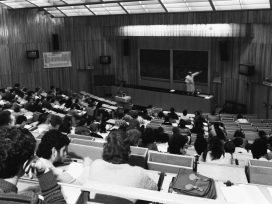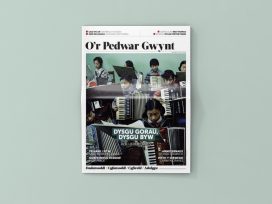Though it was at the forefront of the Baltic States’ rejection of Soviet rule, it took newly-independent Lithuania some time to get to grips with the reform of its higher education. When it did, not all its choices were wise ones. Almantas Samalavicius regrets the move towards the “commodification of learning” and fears there is worse to come.
Unlike the situation in other “old” European countries, which have recently been shaken by mass student protests and general unrest over the radical shifts in the state’s higher education policies and the so-called “commodification of higher education”, there has been almost no public outbursts of student dissent in Lithuania. Nevertheless, this lack of a rebellious spirit in the younger generation should not mislead one into thinking that the state of higher education in this country is by any means satisfactory. Impressions of peace and stability are often deceptive: outward composure may hide deep and complex problems. As we know from past experience, dissatisfaction and frustration can surface at any moment, particularly when one is least ready to acknowledge them. This past winter, dissatisfaction with the state’s social policy and discontent with Lithuania’s economic prospects in the near future, led to mass protests which culminated in outbursts of public unrest that reached their climax when a crowd of disillusioned and angry individuals smashed the windows of the country’s parliament.
A backwards glance
The system of higher education in Lithuania, shaped during the period of Soviet dependence, started to change after the crucial year of 1990 when the country was the first among the Baltic States to break away from the Soviet Union and begin its journey toward a liberal democracy. The structural changes in the university system, however, were delayed; when steps were taken they were slow and clumsy. During the early years of independence, these steps were mostly aimed at restructuring and updating the teaching curriculum. In place of compulsory pseudo-disciplines directly related to official communist ideology such as “dialectical materialism”, “socialist political economy”, “scientific communism”, “scientific atheism” and the like, all of which had taken up a large proportion of university programmes during dependence, subjects formerly excluded for ideological reasons were introduced. These developments in the curriculum were followed by mass changes in institutional status: formerly specialized higher education establishments such as colleges of technology and engineering or teacher training colleges – most of them designated “institutes” during the Soviet era – became universities without much consideration of what it means to be a true university.
During the Soviet regime, Lithuania had only one university, Vilnius University, established as early as 1579 by a decree of Stephan Batory (1533-1586, King of Poland and Arch-Duke of Lithuania – ed.), numbers soon grew to 15 state institutions as well as several private colleges aspiring to university status; others were established later. Other changes were delayed by the pressure of economic problems throughout the first decade of independence; economic problems were also used as an excuse for the lack of essential and timely reconstruction of higher education. On the other hand, old and new universities were now preoccupied with renewing or establishing their infrastructure: renovating the buildings that were handed over by the government, developing the necessary facilities and technologies for research, acquiring computers, building-up libraries and so on. Meanwhile, a class of new, non-university schools of higher education – colleges of technology, business, law, etc. – came into existence and, despite public criticism from university administrators who treated them as junior rivals competing for state funds, managed to spread their net across the country.
A spontaneous and almost uncontrollable growth of the number of universities and colleges, together with a vast expansion of degree-granting programmes, forced those in charge of higher education, mainly the Ministry of Education, to establish an educational watchdog to monitor standards; the Centre for the Assessment of Quality of Studies was established about 12 years ago. Within a few years, the accreditation of teaching programmes – first with the help of local experts and eventually with international expertise – followed. However, even these large-scale procedures failed to prevent the rapid growth of second-rate teaching programmes that often duplicated each other in an absurd manner. It has been calculated that the number of teaching programmes in business administration has now reached 80. The swinging of the political pendulum from the far Right to the Left was primarily responsible for the fact that no stable or long-term higher education policy was established.
Despite the lack of essential structural changes and inconsistent state policy, Lithuania’s higher education nevertheless experienced some positive changes: a variety of new disciplines were included in university curriculums, Lithuanian researchers joined European and international networks, new generations of scholars joined a variety of academic communities. As a result, there was a certain renewal in research paradigms and a tendency towards an interdisciplinary approach in the humanities and social sciences became more conspicuous. However, the conservatism of post-communist academic communities and the rigid hierarchy established during the Soviet era – in particular the stale system of two academic degrees which originated in nineteenth-century German universities, later adopted by Russian imperial higher education and eventually passed on to the Soviet academy – played a role in forcing many prospective young scholars, mostly but not exclusively in the hard and natural sciences, to pursue academic careers abroad, where a one-degree (Ph.D.) system offered them a better opportunity of becoming independent researchers at an earlier age.
More recently, there has been a massive wave of student emigration. This was caused by a number of factors, among them a general disillusionment with the state’s higher education policy, the rise in tuition fees, employment opportunities, general economic decline (not exclusively related to the recent international financial crisis) and the lowering of standards of higher education. Students frequently complained about the quality of university studies, the level of instruction and rising tuition fees, especially after the state limited the number of places in universities for B.A., M.A. and Ph.D. courses financed by the state. At the same time, fees paid by students who failed to receive state grants rose enormously and this prompted many individuals to look West. There, despite recent shifts in educational policies, the prospects seemed better than in their home-country, which was devastated by rising unemployment, lack of social stability and career opportunities.
The growing cult of efficiency and utility
The modern university has become captive to the growing cult of efficiency and, more generally, to the rising demand for higher education not only to be useful but capable of proving and demonstrating this. Despite many wise musings on the importance of the idea of a university, the value of liberal education expressed by such well-known authors at various times in the ascent of modernity as John Henry Newman, Thorstein Veblen, Abraham Flexner, Ortega y Gasset and John Dewey or, later in the twentieth century, by Robert Maynard Hutchins, F. R. Leavis or Michael Oakeshott, the general tendency in the development of the western university system has been associated with efficiency in training professionals, the growing production of so-called “objective scientific research” as opposed to “useless” humanistic thinking and a seemingly vague education of suspect value. All of this is to be replaced by an education that emphasizes the performance of one’s “duties to society”, in most cases understood as performing certain activities that could be calculated, measured, and interpreted exclusively in terms of the “dollar”.
The humanities shared an ambiguous position throughout the Soviet era. On the one hand, they were the usual suspects, since all scholarly disciplines related to any aspect of Lithuanian national culture, society or history and thus capable of contributing to the rise of national consciousness and dignity, the opposite of what Soviet power desired, were a priori distrusted by the system. On the other, the humanities enjoyed a high status in Lithuanian society and their study accordingly had wide popularity and prestige among young people. However, the fall of the Soviet regime, the rapid growth of consumer society and the commodification of almost all aspects of culture in the post-communist realm, affected the so-called “symbolic capital” of the humanities: their place and role in university programmes became dubious, thus vulnerable. Forecasts made several decades earlier by sociologists Christopher Jencks and David Riesman proved to apply to the educational demands in the post-Soviet era as well as to the globalized “western” world: professionalism became one of the main trends informing the goals of higher education.[1]
Some time ago, Paul Shore mentioned three factors which diminish the prestige of the humanities in contemporary higher education: first, the humanities are closely related to non-quantitative aspects of experience and it is difficult for them to resist pressure from the administration; second, despite the widespread opinion shared among the business community that general education has advantages compared to narrow specialization, its members still think the humanities are nothing more than a waste of time; and third, despite the fact that contemporary society acknowledges and favours skills provided by a liberal education, it rejects a large part of the values that are included in the humanities curriculum.[2] He is quite right to insist that the humanities have to break this vicious cycle and, instead of speculating about what is significant and what is not, to assert and demonstrate that the humanities are gates to valuable human experience and means of expression which can be used in such spheres as critical thinking. This is particularly true in the post-communist climate where the growing demands of the market, the rise of the cult of efficiency related to the interests of business and industry, as well as the legacy of a specialist mentality that matured throughout the Soviet era, has created a somewhat distorted image of the humanities and their role in society.
To those responsible for shaping the policy on higher education in Lithuania over the past two decades, the humanities present a problem in so far as they seem suspicious and “unscientific” in constantly going back to their traditions, reinterpreting cultural texts, or rejecting rigid methods of scholarly research. The tension between the hard sciences and the humanities that was extremely acute a decade ago has lessened as of late; however, the hard sciences have won the struggle over state funding for research. A union between business and industry on one hand and science on the other – recently advocated as the state’s priority in higher education – strengthened the hard sciences. Meanwhile, the position and status of scholars working in the humanities has again become ambiguous: their university programmes are constantly under threat and their future is insecure. A number of distinguished scholars of the past century have, on many occasions, exposed the straw dog of the conflict between the natural sciences and humanities. The renowned art historian Erwin Panofsky, who claimed that they supplement each other and that any differences between them are in fact minor, is one example. He made reference to what was denoted in Latin as scientia and eruditio, the first being more oriented towards results, the latter towards process. If one understands the importance of this balance, there should be no conflict.[3] However, this wisdom seems to be beyond the comprehension of our policy makers.
The ethos of higher education in the post-Soviet realm might be characterized as a blind drive toward usefulness, toward anything that brings material results which can be calculated and demonstrated by means of statistical data. The primitive understanding of the role of higher education that characterized the Soviet era is now reborn in new forms and disguised under new slogans adapted for the efficiency of the market economy. One of these is the move towards establishing universities as larger factory-like units. It is suggested that such a country as Lithuanian should limit itself to no more than three or four – even five or six by some reckoning – large state universities instead of today’s 20-plus smaller universities. In some cases, integrating such bodies as the university of agriculture and the academy of veterinary sciences makes total sense; generally speaking, however, the philosophy of higher education circulating among those who shape the future of the universities appears to be based on the motto “the bigger, the better”. This is as absurd as it is outdated. Few politicians concerned with Lithuania’s higher education seem to have heard of the reasoning of the legendary economist E. F. Schumacher, who observed:
We have been brainwashed by the experience of the nineteenth century, when, possibly, technological immaturity was such that it was true to say, “the bigger the better”: only on a larger scale can you get the economics of scale. […] If you have a technological trend, as we’ve had for the past 100 years, for everything to become bigger and bigger, more and more complex, more and more capital-demanding, then of course more and more people are excluded. The thing [in question] is reserved for people who are already rich and powerful.[4]
The idea that large university institutions will be much more efficient in turning out thousands of graduates and will produce more so-called “scientific research” is nothing more than a flight into the compromised technocratic mentality of the nineteenth century.
The rise and rise of the bureaucratic ethos
As early as 1902, the economist Thorstein Veblen, analysing the power mechanisms of capitalist society, emphasized the influence of the “culture of money” on the modern university. Veblen diagnosed how much the universities were affected by the development of industrial society. Among other things, he insisted that mental habits formed by school and the scholastic tradition have an economic value that helps determine the utility of the individual to society.[5] For a long time, education was under the influence of the clergy, but despite the fact that many elements and rituals demonstrating its origins in traditional culture remain, the modern system of education has promoted changes in power structures as well as in education generally. Accordingly, science and scholarship came to be valued not because of their intellectual or cognitive interest, but because of their practical interest to what he called the “leisure class”. He insisted that science flourished only in so far as the life of industrial society was adapted to the model of such reasoning and to the degree of its domination by economic interests. It is only natural, Veblen claimed, that in modern times science became a side-effect of industrial processes.[6]
Despite much theorizing about the end of the industrial era and the rise of post-industrial society advocated by such thinkers as Daniel Bell, it seems that the industrial mode of production is firmly rooted in the realm of post-Soviet higher education, and myths about the uses of social engineering and the value of management in every sphere of human existence remain persistent in both the policy and administration of higher education. Most recently, we have witnessed enormous growth in the management sector in Lithuanian universities, which, in turn, competes for the largest and most efficient departments of management and control over the quality of studies. As a rule, such rapidly expanding units employ young graduates in business administration or related specialties who have an almost mythological belief in their own usefulness and the overall power of data- and information-gathering in the better management of studies and scholarly output. Though I have no doubt of the need for certain methods of ensuring the high quality of university education, something that was all but neglected during the first decade of independence, large-scale social engineering and the domination of the managerial class in contemporary universities raises serious doubts as to what part of university education and research is controllable and what is nothing but a public spectacle reminding us of so-called “reality-shows” that have nothing to do with reality itself.
Belief in the value of “experts” in all spheres of modern society, including higher education, has already had and continues to have serious consequences, the discussion of which goes beyond the scope of this brief essay. The only thing that should be mentioned is the current multiplication of the number of so-called “scientific peer-review” periodicals, research papers and monographs, and textbooks that do nothing to contribute to the advancement of scholarly knowledge. However, this understanding of “research-as-industry”, whose productivity and efficiency can be measured and calculated using contemporary, modish managerial techniques, seems close to the hearts of politicians and administrators alike. The dream of a bureaucracy with total power of control seems to have been reborn in the post-communist milieu of higher education and, occasionally and regretfully, is more and more often supported by university teachers and researchers themselves who have fallen prey to the bureaucratic ethos and managerial ideology brilliantly analysed by a number of thinkers from Veblen to Ivan Illich.
The big sell-off – or is it sell out?
In the past few years, Lithuanian universities have experienced growing political and administrative pressure to reshape themselves according to the matrix of utility, specialization and effectiveness. They are urged to enlarge the spectrum of the “services” they provide for the mystified needs of the market. There are occasional demands to get rid of the “unnecessary lumber” of general education and the liberal arts – parts of the curriculum that supposedly consume students’ time and financial resources – because they have little relation to the market-value of knowledge and skills. The culture of commodification, which is itself a growth industry in the post-communist world and mentalities shaped under its influence, imagines universities as profitable, factory-like productive enterprises managed by professionals qualified in business administration.
Strange as it might seem, the rise of the neo-liberal ideology that has taken over those individuals and groups that supervise higher education policy in Lithuania has coincided with the international financial crisis. This demonstrates the illusions of a “free market” already exposed after World War II by economists such as Karl Polanyi. What is really needed is a radical reconstruction in the financial sphere and, first and foremost, a new way of thinking about the future of society. It is a paradox, but the only remedy offered by those running the ministry of education and politicians backing the most recent reforms is directed by a thinking shaped by neo-liberal doctrines. Cutting state expenditure on higher education, urging and forcing universities to become profitable enterprises, turning a blind eye to the brain-drain and mass student emigration, and at the same time generously sponsoring private institutions of higher education, characterize the lack of ideas on the role and value of higher education. Meanwhile, those individuals who profited from the country’s independence by privatizing former “common property” – industry, real-estate etc. – are now casting their eyes over their next prey: the universities. Higher education is obviously interpreted as a prospective profit-making enterprise as soon as it falls into private hands. This process, however, has only just started and it remains to be seen whether the neo-liberal doctrines adopted by several Lithuanian political groupings will win over the country’s universities, or whether more just and reasonable policies will finally take over.






